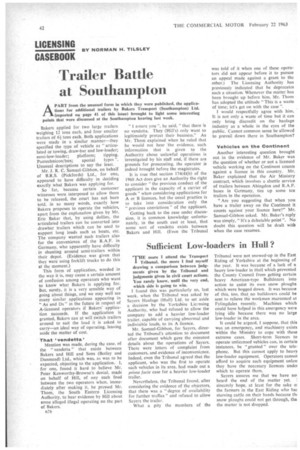Trailer Battle at Southampton
Page 44

If you've noticed an error in this article please click here to report it so we can fix it.
APART from the unusual form in which they were published, the applications for additional trailers by Bakers Transport (Southampton) Ltd. (reported on page 41 of this issue) brought to light some interesting points that were discussed at the Southampton bearing last week.
Bakers applied for two large trailers weighing 12 tons each, and four smaller trailers of 61 tons each. Both applications were made in a similar manner—they specified the type of vehicle as "articulated or towing, draw-bar and low-loader; semi-low-loader; platform; tipping.
Pantechnicon/box; special types ".
Unusual descriptions to say the least.
Mr. J. R. C. Samuel-Gibbon, on behalf of B.R.S. (Pickfords) Ltd., for one, appeared to have difficulty in deciding exactly what Bakers was applying for. So far, because certain customer witnesses were interposed to allow them to be released, the court has not been told, in so many words, exactly how Bakers proposes to operate the vehicles, apart from the explanation given by Mr. Eric Baker that, by using dollies, the articulated trailers can be converted into drawbar trailers which can be used to support long loads such as boats, etc. The company wanted such trailers also for the convenience of the R.A.F. in Germany, who apparently have difficulty in shunting around semi-trailers within their depot. (Evidence was given that they were using forklift trucks to do this at the moment.) This form of application, worded in the way it is, may cause a certain amount of confusion among operators who want to know what Bakers is applying for. But, surely, it is a very sensible way of going about things, and we may well see many similar applications appearing in " As and Ds " in the future in respect of A-licensed operators if Bakers' application succeeds. If the application is granted, Bakers can at will switch trailers around to suit the load it is asked to carry—an ideal way of operating, leaving aside the matter of cost.
That 'vendetta'
Mention was made, during the case, of the " vendetta " that exists between Bakers and Hill and Sons (Botley and Danmead) Ltd., which was, as was to be expected, objecting to the application.
for one, found it hard to believe Mr. Peter Kenworthy-Browne's denial, made on behalf of Hill, of any such feud between the two operators when, immediately after making it, he pressed Mr. Thom, the South Eastern Licensing Authority, to hear evidence by Hill about some alleged illegal operating on the part of Bakers.
B26 "1 assure you ", he said, "that there is no vendetta. They (Hill's) only want to legitimately protect their business." As Mr. Thom explained when he ruled that he would not hear the evidence, such information that is given to the Authority about unlawful operations is investigated by his staff and, if there are grounds for prosecuting, the operator is indeed brought before the magistrates.
It is true that section 174(4)(b) of the 1960 Act does give an Authority the right to consider "the previous conduct of the applicant in the capacity of a carrier of goods" when considering applications for A or B licences, but the usual practice is to take into consideration only the previous convictions" of the applicant.
Getting back to the case under discussion, it is common knowledge unfortunately, in the south east at least, that some sort of vendetta exists between Bakers and Hill. (Even the Tribunal was told of it when one of these operators did not appear before it to pursue an appeal made against a grant to the other.) The Licensing Authority has previously indicated that he deprecates such a situation. Whenever the matter has been brought up before him, Mr. Thom has adopted the attitude "This is a waste of time; let's get on with the case ".
I would respectfully agree with him, It is not only a waste of time but it can only bring discredit on the haulage industry as a whole in the eyes of the public. Cannot common sense be allowed to prevail down there in Southampton?
Vehicles on the Continent Another interesting question brought out in the evidence of Mr. Baker was the question of whether or not a licensed vehicle working on the Continent counts against a licence in this country. Mr. Baker explained that the Air Ministry contract, which involves a shuttle service of trailers between Abingdon and R.A.F. bases in Germany, ties up some ten trailers in the operation.
"Are you suggesting that when you have a trailer away on the Continent it counts against your licence here?" Mr. Samuel-Gibbon asked. Mr. Baker's reply was simply, "It's a debatable point ". No doubt this question will be dealt with when the case resumes.












































































































